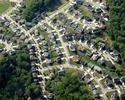I’ve been asked to contribute to a book about smart cities and finance. I looked over the long list of tentative chapter titles provided by the publisher and it’s clearly meant to be an optimistic pragmatic problem solver. There’s an expectation that everything that ails our cities and towns can be fixed with the right combination of technology and creative accounting. read more »
Planning
A Change Is Gonna Come — Anyway
Frequent readers here may have seen me write about my experience growing up in 1970s Detroit. I’ve often said that seeking ways to improve the city and not abandon it, is what propelled me into a career in urban planning. I wanted to be a change agent for cities. Today, more than thirty years into my career, I’m proud of the stature cities have gained over that time; I’m proud of my contribution to it. However, I feel as if cities have risen in prominence in spite of the efforts of planners, not because of them. read more »
- Login to post comments
Housing Affordability and the Pandemic
The median price of homes in Auckland, New Zealand’s largest city, grew by $100,000 in February, reports the Real Estate Institute of New Zealand. That means prices were growing by $25,000 a week. The good news is that these are New Zealand dollars, which are only worth about 72 cents U.S., which means prices grew by “only” US$18,000 a week. read more »
The Black Pearl of Atlantic Beach
About a year ago, I got a call from Sonny Matta, one of the founders of Atlantic Beach Redevelopment Public-Private Partnership, introduced me to Atlantic Beach, South Carolina – a 97 acre city along the Atlantic Coast known to locals as The Black Pearl.
The town was formed in the 1930’s as a vacation destination for black families with thriving black-owned businesses. It became an entertainment center African American musicians could not just play, but also stay, which was not an option even in “integrated” cities like Los Angeles. read more »
- Login to post comments
Reasons People Are Moving From Los Angeles to Dallas — More Important Than Escaping Higher Taxes
Californians escaping high taxes dominate the real estate news. Yes it is true, leaving California because of high city, county and state income tax for Dallas and Texas, with no income tax, is a motivation, but last on my list of seven reasons why people are moving from Los Angeles to Dallas. People will pay more to live where they like living, whether that means higher taxes, higher home prices or higher cost of living. People will leave a place they do not enjoy if they can afford to. This is the case with Angelenos. Residents have found Los Angeles increasingly unpleasant. read more »
Economic Civil War
Our national divide is usually cast in terms of ideology, race, climate, and gender. But it might be more accurate to see our national conflict as regional and riven by economic function. The schism is between two ways of making a living, one based in the incorporeal world of media and digital transactions, the other in the tangible world of making, growing, and using real things. read more »
- Login to post comments
Now That the Suburbs Are No Longer Evil, When Will They Get More Functional?
Nothing like an Urban Riot (and a Pandemic) to cause renewed flight to the suburbs. This recalls when I was starting out in 1968, shortly after the riots in Detroit that caused one of the strongest explosions of suburban growth this nation has ever seen. Suburbs are now more diverse, but they are still far from the egalitarian ideal they could envision. read more »
Woke Politics Are a Disaster for Minorities
Bill Clinton may have been lionized as the “first black President,” and Barack Obama actually was half African, but no politician in American history owes more to African-American leadership and voters than Joe Biden. His campaign never smoldered, much less caught fire, until he was embraced by South Carolina’s heavily black Democratic electorate. read more »
- Login to post comments
Can We Save the Planet, Live Comfortably, and Have Children Too?
The Covid-19 pandemic has brought about what Zillow calls “the great re-shuffling,” as more people head out of major metropolitan areas to work, often remotely, in less dense, even rural areas. read more »
- Login to post comments
The Tinsleys
There’s a model pioneer era farm next to the Museum of the Rockies in Bozeman, Montana that fascinates me. The farm buildings were originally constructed in the town of Willow Creek forty miles away beginning in 1889. The structures were carefully moved to the museum grounds and opened to the public on its centenary in 1989. read more »
- Login to post comments






















